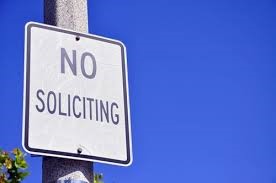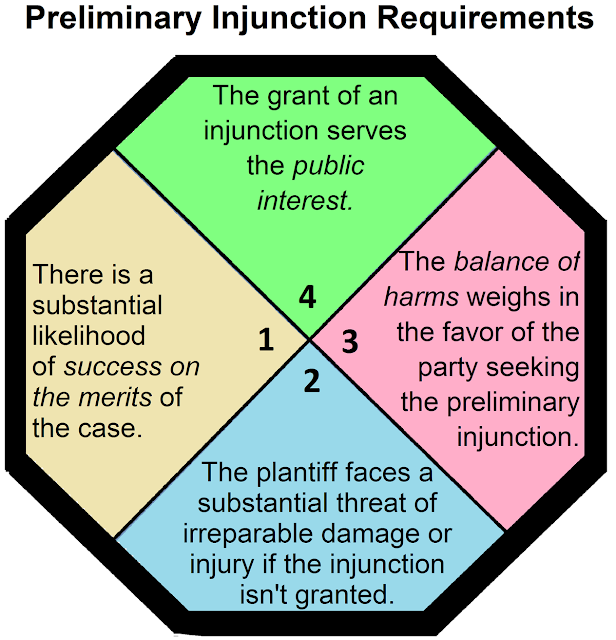Non-Compete Clauses in Employment
Contracts Generally Not Enforceable Where the Average Employee is Concerned
A typical Employment Agreement contains three "Restrictive Covenants": 1) Confidentiality; 2) Non-Competition; and, 3) Non-Solicitation.
 |
| Three Separate Contracts in One |
Hence, while many folks collectively refer to such contracts as "my Non-Compete Agreement," that is not the case. Moreover, in some situations only 1 or 2 of these Covenants are found to be enforceable, while the other two are not.
If an Employee is Let Go because of Alleged Poor Performance,
Then Wouldn't the Former Employer Want the "Worthless Employee" to Join a Competitor?
For example, Pennsylvania law holds that an employee who is fired due to alleged poor performance is not bound by a Non-Competition covenant the employee signed at the outset of his/her employment. In such cases, however, the employee is still bound by the Confidentiality and Non-Solicitation clauses.
Moreover, the law makes relatively clear that an employee's mere violation of a Non-Compete covenant, will not, absent aggravating circumstances, result in an injunction in favor of the employee's former employer, much less a judgment for money damages.
Soliciting Former Customers = Lawsuit
The most significant aggravating factor is, by far, soliciting former customers away from your former employer, and securing new business from them on behalf of your new employer.
So, the "secret" referred to in the title of this Post is as follows: If you do not solicit your former customers, you will likely have no problem if your violation of the Non-Compete is limited to taking a job with a competitor of your former employer.
However, if while working for a competitor you violate the Confidentiality and/or Non-Solicitation clauses in your Employment Agreement, problems will almost certainly arise.
True Trade Secrets Are Rare, Indeed
If I Violate My Non-Compete Clause by Going to Work for a Competitor, but do not Use My Former Employer's Confidential Information at My New Job, and I Do Not Solicit Customers Away From My Former Employer, Will I Get in Trouble?
That is the magic question and the answer is "No, unless you know a true Trade Secret owned by your former employer." Trade Secrets are very rare, and odds are you do not know any.
However, if you are one of 7 people who work for Bimbo Bakeries that know the recipe that results in those amazing nooks and crannies, you may want to rethink your departure to a competitor such as Hostess!
 |
| That's One Delicious Trade Secret! |
A scenario that is much more common than the English Muffin matter arises when an employee goes to work for a competitor (or starts a new business), and thereafter uses Confidential Information taken from the former employer, and begins to solicit clients the employee used to service while employed with the former employer.
 |
| If You Avoid Soliciting, You Avoid Trouble |
Typically, if an employee bound by a restrictive covenant goes to
work for a competitor and starts to solicit clients from his/her old employer, the
old employer will file suit immediately,
and will ask the court to immediately grant a preliminary injunction. In these situations, the former employer will
not necessarily delay filing suit until it starts to lose clients; mere evidence of the former employee's efforts to solicit such business will be enough to spur a legal action.
not necessarily delay filing suit until it starts to lose clients; mere evidence of the former employee's efforts to solicit such business will be enough to spur a legal action.
This is Generally the Standard in All Courts -
It is Easy for Employer to Satisfy if Clients Have Been Taken
What Can Happen at a Preliminary Injunction Hearing Relating to a Claim That an Employee Has Violated a Non-Compete Employment Agreement?
An employer seeking a Preliminary Injunction against an employee who had signed an Employment Agreement containing the aforementioned Restrictive Covenants wants to prove 3 things:
1) the former employee is working for a competitor;
2) the former employee absconded with the the employer's Confidential Information; and,
3) the former employee used the Confidential Information in the course of successfully soliciting clients away from the employer and to the employee's new employer sometimes even trying to take clients is enough to satisfy the standard).
 |
| Making a Sale to a Former Client in Violation of Non-Solicitation Covenant in Your Employment Agreement is Death Knell to Your Future Employment |
What Are the Possible Outcomes at a Preliminary Hearing for Breach of a Non-Compete Agreement?
There are many, but here are some permutations.
* If the employer can prove only that its former employee is now working for a competitor, it is unlikely that an injunction will issue.
* If the employer proves the former employee is now working for a competitor and possesses Confidential Information - but cannot prove that the employee has engaged in solicitation -- it is possible that an injunction will issue, but if so it will likely only order the employee to destroy all of the Confidential Information he/she has.
* If the employer proves the former employee is now working for a competitor and that the former employee has solicited clients without success -- but cannot prove the employee has misappropriated Confidential Information -- it is possible that an injunction will issue, but it will likely only order the employee to stop soliciting the employer's clients.
Being Forced to Resign from New Job is The "Death Sentence" in a Preliminary Injunction hearing
What is the Worst Thing That Can Happen If I Take My Employer's Confidential Information and Violate My Non-Solicitation or Non-Competition Agreement?
In many such situations, evidence of aggravating factors often results in an injunction that also orders the former employee to immediately cease employment with his/her new employer. The two most common aggravating factors are:
1) Evidence introduced at the Preliminary Injunction Hearing proves
that the former employee had not only solicited business from his/her former clients, but had actually secured new business from these clients at the expense of the former employer, and to the benefit of the new employer; and/or,
2) Evidence introduced at the Preliminary Injunction Hearing shows that, as the employee’s
employment was winding down, the employee engaged in a scheme to misappropriate the
successfully ferrying customers away from the former employer,
and into the waiting arms of the new employer.
Injunctions are the most common relief sought when a former
employee is caught soliciting clients of his/her former employer. Obtaining an injunction (i.e.
“equitable relief”) is the “holy grail” of non-compete litigation. That is so
because a plaintiff does not need to prove financial loss in order to
get an injunction. Rather, it need only show that the former employee engaged in wrongdoing in violation of the Restrictive Covenants found in his/her Employment Agreement.
By comparison, in order to recover damages in a breach of
contract case, a plaintiff must show that it suffered actual economic damages. Proof of bad intent or malfeasance by the former employee, while helpful, is not necessary.
 |
| Malfeasance = Injunction |
The mere fact that an employee
violated restrictive covenants does not prove that a former employee had bad intent or engaged in malfeasance, so an injunction ordinarily will not issue absent some evidence of same. Toss in evidence that the former employee violated the Confidential Information and/or Non-Solicitation clauses in the Employment Agreement, however, and the "malfeasance" requirement is satisfied, and injunctive relief will most assuredly follow.
Philadelphia
Area Non-Compete Lawyer
HERE
ARE SOME OTHER ARTICLES YOU MAY FIND WORTHWHILE:
Are Non-Compete Agreements
Enforceable in Pennsylvania? How Can I Negotiate a Non-Compete?
Non-Compete Agreements -
Legally Enforceable or Not, Negotiation is Often the Key
Need To Talk? Call Today for a Free Consultation
610-647-5027
Thanks for checking in with
us.







